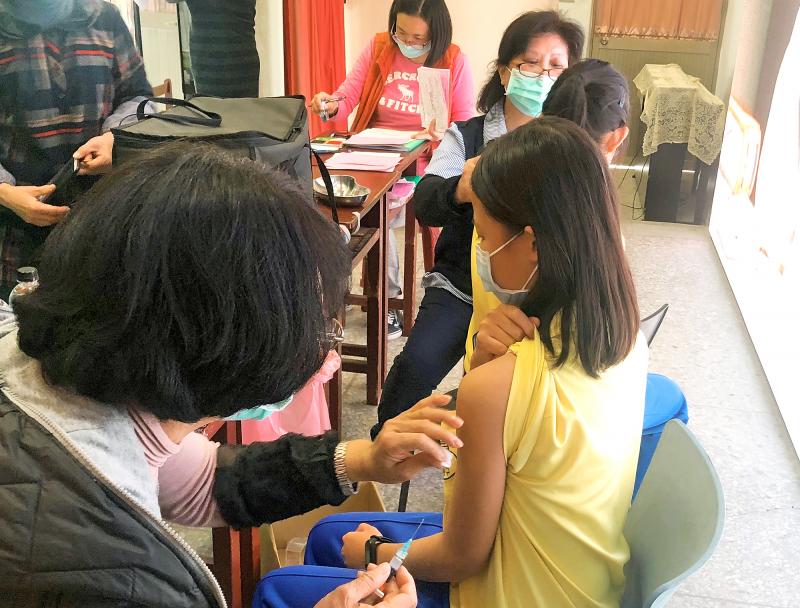Taiwan is to begin administering the Pfizer-BioNTech (BNT) COVID-19 vaccine to high-school students on Wednesday, and the Central Epidemic Command Center (CECC) has advised that strenuous exercise be avoided for two weeks after innoculation.
Recipients should watch for symptoms of myocarditis and pericarditis — inflammation of the heart muscle and outer lining of the heart respectively — within 28 days of the BNT vaccination, Minister of Health and Welfare Chen Shih-chung (陳時中), who heads the center, said on Sunday.
Symptoms include pain, pressure or tightness in the chest, shortness of breath, feelings of having a fast-beating, fluttering, or pounding heart, fainting and a lower tolerance for exercise, Chen said.

Photo: CNA
People who experience such symptoms should seek prompt medical attention and tell doctors when they were vaccinated.
Concerns over the side effects of mRNA COVID-19 vaccines, such as the BNT vaccine, were raised after reports that some young adults developed heart problems after getting the jabs.
The US Centers for Disease Control and Prevention said last month that the risk of myocarditis is 18.5 cases per 1 million second doses of the BNT vaccine in people aged 18 to 24, considered to be the group most at risk.
The BNT vaccine is still the only COVID-19 vaccine that was demonstrated by phase 3 trials to be effective and safe for participants aged as young as 12.
The BNT vaccine has been authorized for use in Taiwan for people aged 12 years or older.
Taiwan is scheduled to begin administering the vaccine on Wednesday, with people aged 12 to 17 first in priority.
Students at junior or senior high-schools have the choice of receiving the vaccine either at their school or a hospital.
The health department in each municipality is to arrange vaccine clinics on school campuses for students.
Those who opt not to take the vaccine at school can make other arrangements on the 1922.gov.tw vaccine registration platform, the CECC said.

DEFENSE: The National Security Bureau promised to expand communication and intelligence cooperation with global partners and enhance its strategic analytical skills China has not only increased military exercises and “gray zone” tactics against Taiwan this year, but also continues to recruit military personnel for espionage, the National Security Bureau (NSB) said yesterday in a report to the Legislative Yuan. The bureau submitted the report ahead of NSB Director-General Tsai Ming-yen’s (蔡明彥) appearance before the Foreign and National Defense Committee today. Last year, the Chinese People’s Liberation Army (PLA) conducted “Joint Sword-2024A and B” military exercises targeting Taiwan and carried out 40 combat readiness patrols, the bureau said. In addition, Chinese military aircraft entered Taiwan’s airspace 3,070 times last year, up about

A magnitude 4.3 earthquake struck eastern Taiwan's Hualien County at 8:31am today, according to the Central Weather Administration (CWA). The epicenter of the temblor was located in Hualien County, about 70.3 kilometers south southwest of Hualien County Hall, at a depth of 23.2km, according to the administration. There were no immediate reports of damage resulting from the quake. The earthquake's intensity, which gauges the actual effect of a temblor, was highest in Taitung County, where it measured 3 on Taiwan's 7-tier intensity scale. The quake also measured an intensity of 2 in Hualien and Nantou counties, the CWA said.

The Overseas Community Affairs Council (OCAC) yesterday announced a fundraising campaign to support survivors of the magnitude 7.7 earthquake that struck Myanmar on March 28, with two prayer events scheduled in Taipei and Taichung later this week. “While initial rescue operations have concluded [in Myanmar], many survivors are now facing increasingly difficult living conditions,” OCAC Minister Hsu Chia-ching (徐佳青) told a news conference in Taipei. The fundraising campaign, which runs through May 31, is focused on supporting the reconstruction of damaged overseas compatriot schools, assisting students from Myanmar in Taiwan, and providing essential items, such as drinking water, food and medical supplies,

New Party Deputy Secretary-General You Chih-pin (游智彬) this morning went to the National Immigration Agency (NIA) to “turn himself in” after being notified that he had failed to provide proof of having renounced his Chinese household registration. He was one of more than 10,000 naturalized Taiwanese citizens from China who were informed by the NIA that their Taiwanese citizenship might be revoked if they fail to provide the proof in three months, people familiar with the matter said. You said he has proof that he had renounced his Chinese household registration and demanded the NIA provide proof that he still had Chinese